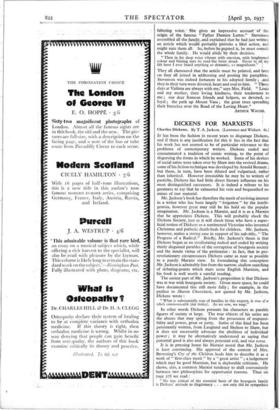STEVENSON'S STEP-DAUGHTER
This Life I've Loved. By Isobel Field. (Michael Joseph. iss.)
THERE is a naive and natural simplicity about Mrs. Isobel
Field's reminiscences which compensates for their obvious shortcomings in construction, arrangement, and literary finish. In the formal virtues of competent autobiography the book is almost entirely lacking. There is hardly a date from start to finish. The author's memory wanders off along every by-path of suggestion, so that it is often quite confusing to unravel the thread of narrative. And yet the record is so clearly honest and sincere, so permeated with the indefinable charm of personality, that it soon gets hold upon the reader's imagination, mellowing in atmosphere as it goes. This is, in short, a fascinating story, no less attractive in its childish trivialities than in its eventual approach to literary history.
Mrs. Field's superficial claim to public interest lies in the fact that she is a daughter of the devoted Mrs. Osbourne, who married Robert Louis Stevenson, without an idea that he would soon be famous, with little hope that his life could be prolonged, and solely out of affection for his temperament and appeal. But long before the Stevensons break into the Osbourn circle, Mrs. Field has a skein of youthful recollections to unravel, which give new life to the American scene in the years that followed the Civil War. Her memory is picturesque, actual, unreflecting. It transports the autobiographer from a com- fortable home in Indianapolis to the rough rations of a mining camp ; it catches glimpses of unintelligent autocracy in a provincial school ; it carries her from San Francisco to Paris, where she attended classes in Julien's studio ; it recounts the first meeting with Stevenson, at the little village of Grez- sur-Loing near Fontainebleau ; and it opens the skeleton- cupboard of domestic disagreement, which culminated in her mother's divorce, and her- father's sudden disappearance, leaving a second wife without means or recompense.
Meanwhile Isobel Osbourne herself had married Joseph Strong, the artist, and embarked upon a happy Bohemian life in San Francisco. She revels in- these memories—their very struggles are romantic, their scrambled meals are banquets, the companionship of fellow artists and actors is all-sufficing. Fortune seemed about to smile, when a commission from a steamship magnate sent them to Honolulu, and the King of Hawaii befriended them, so that for seven years they lived in State circles, making friends with all kinds of " notabilities." The next change was to Sydney, where at first apparent penury threatened her. • Then Stevenson, who had meanwhile married her mother, urged her to accompany them to Vailima, where he had just acquired an estate. She did not want to go. She preferred her independence, and she had always been conscious of a hidden antagonism towards R. L. S. But now he made an appeal to her, which carried her off her feet. He was lonely and childless, he said ; condemned to exile, and yearning for a home. If she and her brother Lloyd would come to Samoa, he would have a sense of family life to comfort him. Mrs. Field protests that she was always " rather a meek person," who " obeyed the nearest man." She obeyed Stevenson, went with him to Vailima, and " felt myself to be truly his loving daughter."
Certainly, she proved herself so ; and the Samoan chapters _ of her autobiography will, • no doubt, be the most generally popular division of the book. They give, in their artless, simple fashion, an engaging picture of the Vailima household, and of Stevenson's dual attitude to his companions—at one moment, the dominating spirit of the little kingdom, at the next, dependent upon them for every need and comfort. He worked feverishly hard, starting early in the morning ; and, when his strength failed, his step-daughter became his secretary. She even taught him the deaf-and-dumb alphabet, so that he could dictate to her on his fingers, and save his -
-faltering voice-.--She gives an impressive accoUnr-Of :the origin of the famous " Father Damien Letter." :Stevenson assembled all the family, and explained that he had just written an article which would probably provoke a libel action, and might ruin them all. So, before he,Nnted it, he must consult the whole family He would abide by their decision.
" Then in his deep voice vibrant with .emotion, with heightened colour and blazing eyes he read-the letter aloud. Never in all my life have I ever heard anything-so dramatic, sa magnificent." t They all clamoured that the article must be printed, and later on they all joined in addressing and posting the pamphlets. Stevenson was indeed fortunate in his adopted family ; tand they in their turn were devoted, heart and soul to him. " Those days at Vailima are always with me," says Mrs. Field. " Louis and my mother, their loving kindness, their tenderness to me ; our dear Somoan friends and helpers, so devoted, so loyal ; the path up Mount Vaea ; the great trees spreading their branches over the Road of the Loving Heart."
ARTHUR WAUGH.



































































 Previous page
Previous page